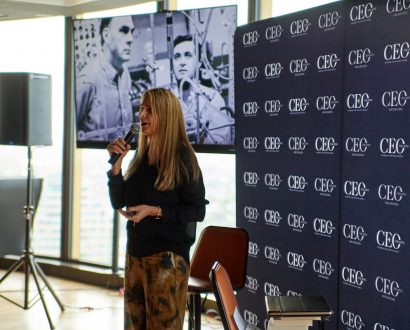Do deep human relationships lie at the core of solving global issues?

"From the time we are born, we are taught that we have to be the superhero. We have to do it all alone. We are pushed into hyper-individualism," author Jean Oelwang said during a stimulating speech at Work Club Global in Sydney on 1 December.
This statement was inspired by a past conversation she had with human rights lawyer, George Bizos – who represented Nelson Mandela during the notorious 1963 Rivonia Trial – where he repeatedly said, "No one does it alone." Her address that evening championed a similar school of thought.
Oelwang is the founding CEO and President of Virgin Unite and has worked on several global collectives over the last 19 years. In her book, Partnering: Forge the Deep Connections That Make Great Things Happen, she also talks about how nurturing relationships with depth and purpose has an impact on all other spheres of our lives, including the professional space.
She offers practical tools, insights from her interviews with successful business and life partners and invites her readers to think collaboratively instead of individualistically.
At an evening hosted by The CEO Magazine and organized by Flying Ruby Events, she spoke to guests about building deep human connections and then laddering them up into large-scale collaborations to make a difference in communities and the world at large.
Deep relationships as a factor of success
"One of my favorite studies about human relationships and collaboration is the Harvard Grant Study," Oelwang said. "It’s an amazing study where the journeys of about 700 men have been tracked for 80 years of their lives – some of them are still alive. What the study tries to do is find out what the answer to a long, healthy, successful life is.
"It wasn’t about the breadth of relationships as we’re taught to believe nowadays, but the depth."
"In the beginning of the study, they thought they were going to focus on things like what people ate and how much they exercised. But the single most important factor was the relationships these men had in their lives. It was the single most important factor; and it wasn’t about the breadth of relationships as we’re taught to believe nowadays, but the depth."
It was interesting to note that – as per the study – the happier the men were, the more successful they became.
The observations she spoke about, in turn, had Oelwang’s thoughts go back to how smallpox was ended in India, how apartheid was ended in South Africa and how we discovered an issue with the ozone layer and started to work towards protecting it.
"What we found is that deep connections were also at the very center of these great human achievements," she continued. Not just a hypothesis, the idea was based on her personal interactions and interviews with people who were involved in these global phenomena.
Playing your role
"When we think about ending apartheid in South Africa, we think about Nelson Mandela. But one moment that changed my perspective on this forever was when we were in South Africa a few months after Mandela’s death to celebrate his life," she explains.
"We were packed into this tiny white tent. It was pouring, we were soaked on our heads and under our feet. There were about 200 of us in the tent and, yet, there was this electric current of joy that ran through the crowd. One after the other, these anti-apartheid heroes got up under this rickety stage to pay tribute to this great man.
"Any one of them could have been Mandela, but they chose to play the role in the collective where they could make the biggest difference."
"The love they had for each other was extraordinary," she said.
"So, I turned to the woman next to me – she was one of their family members – and I said to her, ‘How on Earth did all of these people who helped end apartheid stay so deeply connected through the horrors of it all?’ She told me they had a purpose that was so powerful, to end apartheid, and any one of them could have been Mandela, but they chose to play the role in the collective where they could make the biggest difference’."
The woman told Oelwang that there wasn’t just Mandela, but there was a planner, a person who looked after the women’s marches across the country, a rebel rouser, a lone voice in the parliament that was offering full support, and many more. The role that Mandela played was the one that could get such an intoxicating purpose out into the world.
Staying connected in leadership roles
Oelwang’s words segued into several issues that society has overcome, but the common factor among them was the importance of interconnectedness and profound deep connections, unstoppable friendships.
"I found that, with every glass ceiling that I broke, I felt more and more alone and less and less myself," she expressed.
"With every glass ceiling that I broke, I felt more and more alone and less and less myself."
"But I was very fortunate that I had this opportunity to help start Virgin Unite some 18 years ago. And one of the first projects we had was to help get The Elders up and running. The Elders is a group of global leaders who were brought together by Nelson Mandela and Graça Machel to see how they could work behind the scenes on conflict resolution.
"As I watched these incredible folks, I started to think about how they became who they were in this world. And what was really clear to me is that they became who they were because of each other and because of the other relationships they had shaped in their lives."
Jean Oelwang’s book, Partnering, is now available to buy here.